Worked a little bit more on the ABIv1 x86_64 started long time before. Found some errors and got the FP-IDE to work and some simple example sources. But LCL and fpGUI still do not work. The main reason for that are the changes between ABIv1/ABIv0 and some inconsistencies of 32bit/64bit types.
Bad thing, changes are not denoted in the C-header files for AROS, so it’s a very annoying comparing work done by hand to find if there are differences. Differences in Library offsets for functions in the most important libs are done and exec structures are also fixed.
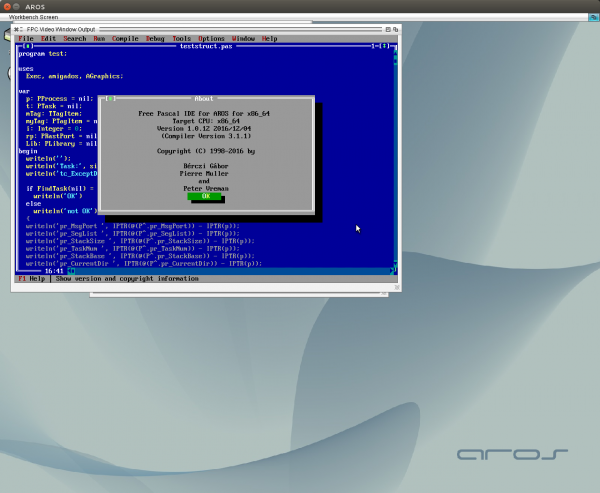
FP-IDE on x86_64 AROS
After the compilation problems are solved, it is also possible to compile and use EdiSyn (finally a good editor in ARM-AROS :-P).
So here it is, same case as for Mapparium, it’s a special version for ARM-AROS (0.55). This new Version has already some advanced features like reload last open files (also remember the line the cursor is placed)
Download at EdiSyn Page
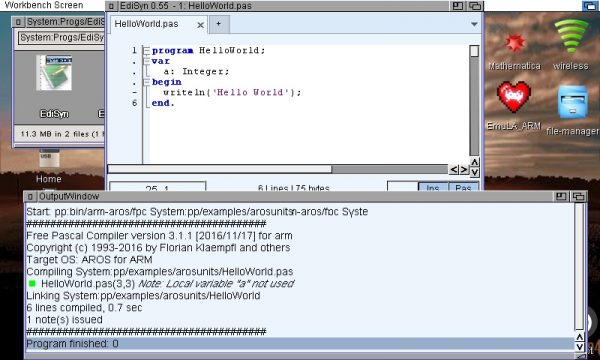
EdiSyn 0.55 ARM-AROS
I found the reason Mapparium, Edisyn and some other application crashed. All things have to be compiled with „-CaEABIHF“ to make sure all sources use the same way to transfer floating point values. The -dFPC_ARMHF is only needed by the compiler, the ABI has to set for every other compilation, so I added them also to the fpc.cfg, fp.cfg.
I created Mapparium Release, with the latest not official Release 0.7 which already has some basic GPS Support (position only) and the Zoom and Find me Buttons are moved into a small menu inside the map (like google maps and open streetmap webpage also have). The menu can be hidden if this disturbs someone 😉
Releases for all the other Platforms will need more time.
Download at the Mapparium Page
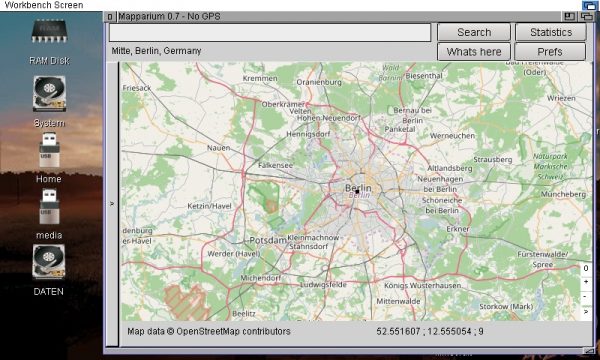
Mapparium 0.7 on RasPi AROS
Tried a little bit more the ZuPaPlayer on ARM, seems the Zune on ARM is not on the same status as i386. A List event fired on i386, seems never fire on ARM, which makes it impossible to move songs in the list. Because I compiled the libmikmod myself, I increased the buffer for the AHI mikmod module (on i386 AROS I had some stutter problems). It works but now the pause button needs nearly 500 ms before it really stops. Not so nice, so I edited the AHI driver again a little bit and calculate the Buffersize dynamically from the frequency to cover 120 ms (got the idea from the Windows driver). Works rather nicely. So I made a release for ARM-AROS of ZuPaPlayer 0.2
Download: ZuPaPlayer 0.2 for arm-aros
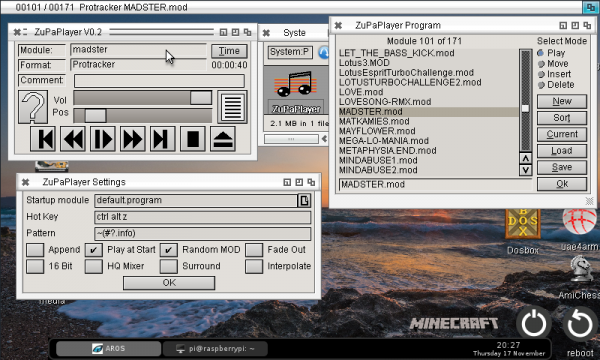
I tried some linking to AROS C Linklibs on ARM-AROS and the basic example with sqlite3 works rather nicely. But more interesting for me would be the mikmod lib because then I could compile ZuPaPlayer for my RasPi.
The main problem is the Libmikmod is not available for arm as binary. But I found the source a while ago. I tried to compile directly on the ARM-AROS and it works. And I was also amazed that also my ZuPaPlayer compiles without much changes… and you would not believe ZuPaPlayer even plays the sounds without any problems 🙂
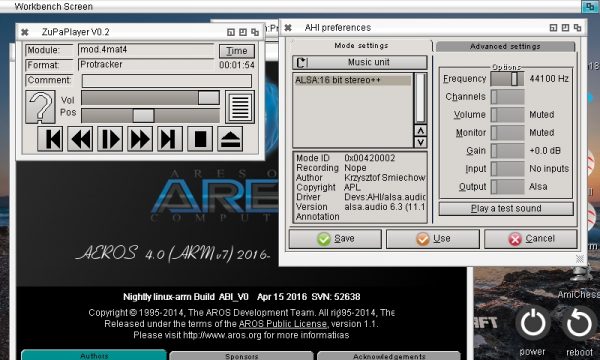
ZuPaPlayer on arm-AROS
Very nice, my Raspi has a touchscreen, so now I can use my Raspi as nice little Mod Player 😉
Compiled some programs for ARM AROS, most work, but some also do not work, with a rather strange error message. First I will add my new startup code to official repository, then I will try to debug this problem.
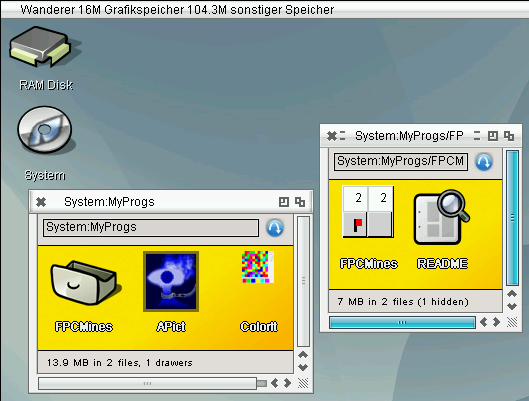
Games on ARM AROS
Download for arm-aros:
FPCMines – A Mines clone
ColorIt – Fill field with one color
APict – Simple Image Viewer
Working on the startupcode, added option to alloc a new Stack if the freepascal needed stack is bigger than the stack supplied by AROS. (which is mostly the case, AROS delivers 40k stack, FPC wants 256k). It works, even not completely finished. It’s my first bigger project with arm assembler better let someone check with more arm assembler knowledge 😉
I tried also LCL on arm, but it did not work, the Handlemessage inside MUI/Zune makes the problem. When I checked on the Structures involved. I noticed that on AROS there are two different structures, one for BINCOMPAT mode one without this define. Until now the BINCOMPAT was only needed for m68k, but there is no special m68k-aros but only m68k-amiga and the x64-aros does not work well because AROS on x64 is near to not usable.
The define AROS_FLAVOUR_BINCOMPAT is now defined as default for arm-aros and it seems to work. Compiled the FPCMines as first try and it is working well.
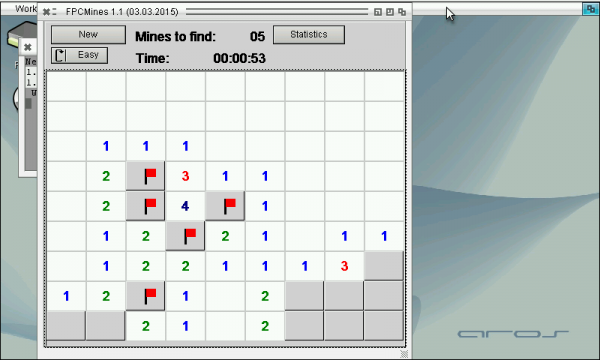
FPCMines on ARM AROS
Included more menus and key strokes for the different functions, the hotkeys for existing buttons is very easy, there is a special field to trigger them (MUIA_ControlChar). That means you do not have to care about, Zune does it care about. But for other hotkeys, like Volume up, down, mute and so on, it is not possible. I did not get it to work using InputEvent field. The event is fired on keypress. I didn’t find a way to check which key is pressed because the Message pointer points to a Zero-ed area, maybe a Zune bug. In the net I didn’t find a source using that function (except directly, but not via a Hook). Of course it is nice to have the hotkeys also denoted at the menu entry. Sadly the MUI_MenuItem_Commandstring still does not work, so the Amiga sign is always shown at the menu entry with the key. I filed a Bug report about it, but I checked the latest source, it’s still not fixed. I looked into the source and found that this field is just not used and sent to the system. I’m not very good at C coding but even I was able to include this, because it’s just equivalent to the enabled flag for example. The Diff of this change is now included for ABIv0 and ABIv1 and it also work in the latest nightly. Hopefully the next Icaros will also include this change, until that the Amiga-key sign is there, but you do not need to press it.
Besides this I also included a hotkey to open ZuPaPlayer if it is hidden. (Ctrl-Alt-z is the default, but can be configured in the Prefs Window). For this purpose the commodities.library unit had to be included to Freepascal.
Download: ZuPaPlayer 0.2 for ABIv0 i386 AROS
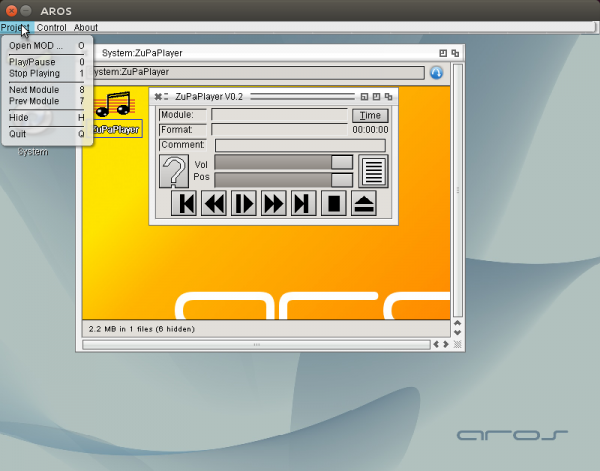
ZuPaPlayer 0.2 with Menus and Hotkeys
Chain-Q added support for 68000 to freepascal compiler. It needs special care because it has some additional alignment need on read/write to structures. But to try it on a 68000 Amiga it should be also Workbench 1.3. the current RTL implementation needs at least 3.0. It was rather easy to create a RTL which also works on 1.3 (via defines) but also the init code (written in assembler) must be changed. I have to find out how to make defines inside prt0.as. Then it could be even added to the official repository. I wrote a little testprogram to test the RTL and make some basic alignment tests. Both works well now.
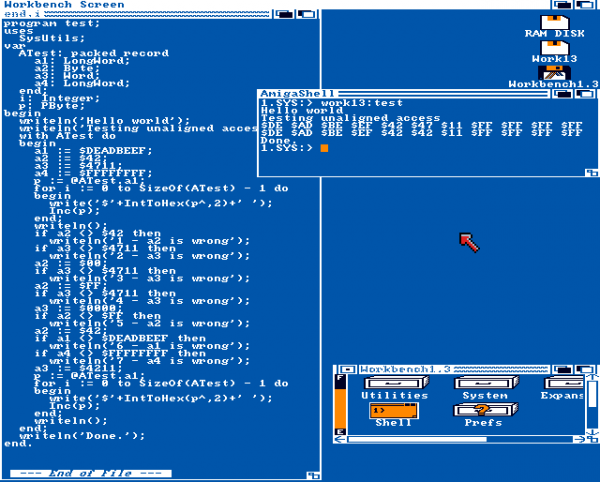
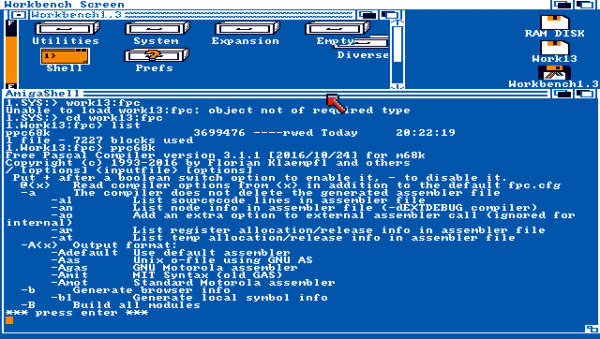
Worked a little bit more with GPS. At Aros-Exec, someone was so kind to test and other GPS with the program seems he also found one which works.
I put all things together and added some more debug output. In principle its still only a tool to learn how to operate GPS devices to build to Mapparium later. But in fact it’s also a nice little tool to play with. The record track function was so easy to implement so it could be a more lightweight tool to record Tracks, instead of the big Mapparium. It even works on Amiga without GFX-card (unlike Mapparium).
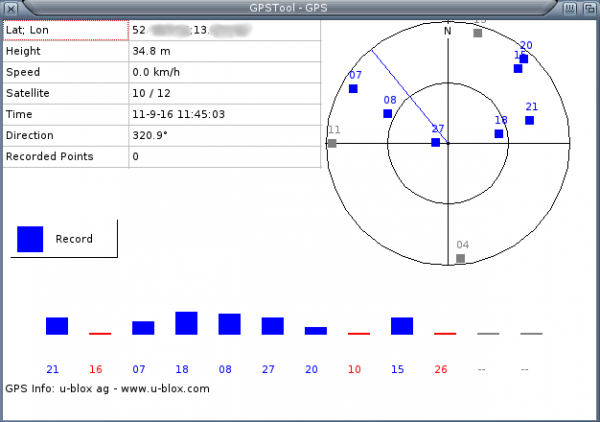
It got an own page, on the Mapparium page it would be too messy. But I don’t think they will be much updates on the little program, maybe later I will clean up a bit and put the source to github.
Download at: GPSTool Page










